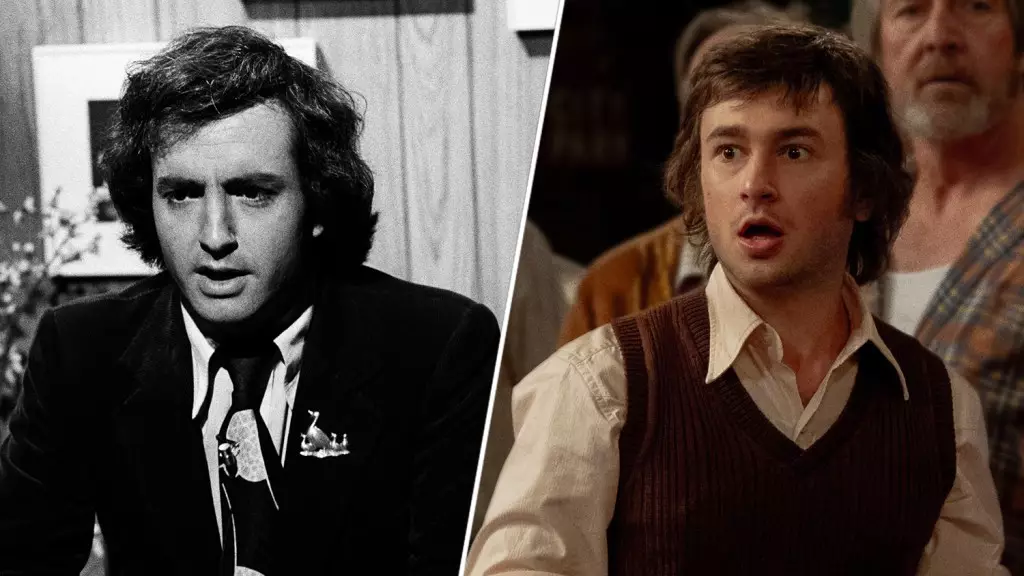In the realm of comedic television, few shows have made as indelible a mark as “Saturday Night Live” (SNL). Gabriel LaBelle, known for his portrayal of Lorne Michaels in the film “Saturday Night,” recounts his unique experiences while filming a story deeply entrenched in the show’s origins. The film is a tribute to the birth of SNL, capturing the energy and excitement of the 1975 television landscape. LaBelle’s opportunity to witness a live taping of the show, particularly the episode hosted by Josh Brolin, offered him invaluable insights into the comedic cadence and atmosphere that defined the era.
During an intimate visit to 30 Rockefeller Plaza, LaBelle came face to face with the reality of SNL, mingling with its creator and fellow characters from behind the scenes. This visit was not just a publicity stunt; it became a formative experience that influenced LaBelle’s portrayal of the enigmatic creator, Lorne Michaels. The backdrop of a live audience, raucous laughter, and a palpable sense of anticipation allowed LaBelle to absorb the very essence of what Michaels must have experienced during the show’s inception.
It is often said that the best performances stem from a great deal of preparation and immersive research. LaBelle’s dedication to authenticity shines through in his recollections. By attending a live taping, he wasn’t merely observing; he was internalizing the dynamics of the show, the improvisational spirit among comedians, and the pressures of performance. Such preparatory steps highlight the importance of an actor’s connection to their character. They serve as the linchpin that bridges the gap between fiction and the reality it reflects.
LaBelle’s comments on his interactions with notable personalities such as Scarlett Johansson and director Jason Reitman reveal an interesting perspective on collaboration and humility within the creative process. Rather than dominating conversations, he chose to absorb the wisdom and energy around him, mirroring the collaborative spirit that fuels successful comedy. This illustrates a profound understanding of the actor’s role—not just as a performer but as a part of a larger narrative tapestry woven by many creative talents.
“Saturday Night” is a film that dives into the historical aspects of television comedy, shedding light on the unsung heroes who shaped it. The 90 minutes leading up to the inaugural SNL broadcast were filled with challenges, triumphs, and a whirlwind of creative energy. LaBelle’s portrayal sheds light on Lorne Michaels not just as a creator but as a visionary guiding a group of young comedians through an unprecedented venture. It’s a story that resonates deeply, especially with fans who revere SNL as a cultural institution.
Moreover, the film serves as a reminder of the roots of comedy and how passion, risk, and camaraderie drove a new generation of comedians. In a world increasingly dominated by scripted reality shows and algorithmically driven content, revisiting the spontaneity and rawness of early comedic television serves a nostalgic purpose. It speaks to a time when comedy was unpolished, frequently controversial, and, above all, deeply connected to the events of the day.
As the film gears up for its nationwide release, there is palpable curiosity surrounding Lorne Michaels’ reaction to his portrayal. LaBelle admits uncertainty about whether Michaels has seen the final cut, revealing a level of respect and deference towards the iconic producer. His comments indicate a broader theme in the entertainment industry: the delicate nature of artistic interpretation and the conversations that accompany it. Will Michaels embrace the portrayal of his character? Or will he choose to remain the somewhat elusive figure he has always been?
This uncertainty adds layers to the anticipation surrounding the film’s premiere. It emphasizes the importance of audience perception and critical reception, as fans of SNL and cinema alike are eager to dissect how the film captures the spirit of a moment that reshaped television comedy.
Gabriel LaBelle’s exploration into the life of Lorne Michaels offers much more than a glimpse into the past; it is an invitation to appreciate the nuanced landscape of comedic storytelling and its profound impact on culture. The film “Saturday Night” promises to be not only a look back at a pivotal moment in television history but also a celebration of creativity, collaboration, and the enduring influence of comedy in society.


Leave a Reply